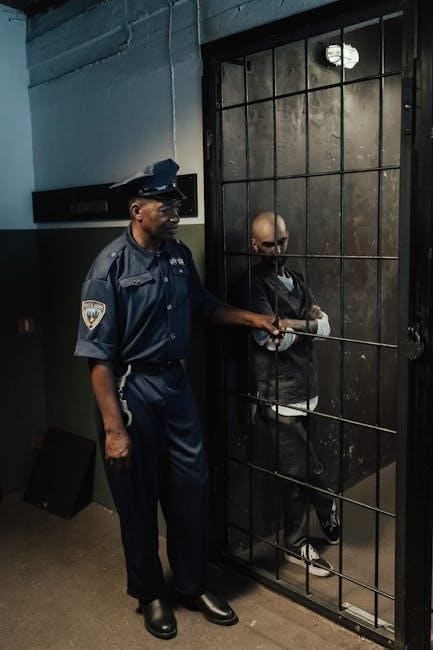The Texas Criminal and Traffic Law Manual is a comprehensive guide to criminal offenses‚ traffic laws‚ and legal processes‚ ensuring compliance with Texas law.
Overview of the Manual’s Purpose and Structure
The Texas Criminal and Traffic Law Manual serves as a detailed reference guide for law enforcement‚ judicial officials‚ and legal professionals. It provides a structured overview of criminal offenses‚ traffic laws‚ and legal procedures in Texas. The manual is divided into sections covering the Penal Code‚ Code of Criminal Procedure‚ and traffic regulations. It includes annotations‚ case references‚ and compliance guidelines. Designed for practical use‚ it ensures understanding of legal frameworks. Regular updates reflect changes in legislation and court decisions‚ making it an essential resource for staying informed on Texas criminal and traffic law.
Importance of Understanding Texas Criminal and Traffic Laws
Understanding Texas criminal and traffic laws is essential for ensuring compliance‚ reducing legal liability‚ and upholding justice. The manual provides clarity on complex legal statutes‚ enabling law enforcement‚ attorneys‚ and citizens to navigate the system effectively. It ensures proper enforcement of laws‚ protects individual rights‚ and maintains public safety. Staying informed about legal changes and interpretations is crucial for fair proceedings and accountability. This knowledge fosters a well-functioning legal system‚ promoting trust and adherence to the rule of law across Texas communities.

Structure of Texas Criminal Law
Texas criminal law is systematically organized‚ categorizing offenses by severity‚ outlining penalties‚ and detailing legal procedures to ensure compliance and consistency in enforcement and adjudication.
Classification of Criminal Offenses in Texas
Texas classifies criminal offenses into misdemeanors and felonies‚ with misdemeanors further divided into Classes A‚ B‚ and C. Felonies are categorized from State Jail to First Degree. Each classification carries specific penalties‚ ensuring proportional justice. Traffic violations are treated separately‚ with offenses ranging from minor infractions to criminal charges. This structured system aids law enforcement‚ courts‚ and legal professionals in applying consistent and fair enforcement practices statewide‚ ensuring clarity in legal proceedings and public understanding of criminal consequences.
Penalties and Sentencing Guidelines
Texas imposes penalties based on the severity of offenses‚ with misdemeanors classified as Class A‚ B‚ or C‚ carrying fines and jail terms. Felonies range from State Jail to First Degree‚ with sentences from 180 days to life imprisonment. Aggravated offenses and repeat convictions increase penalties. Traffic violations result in fines‚ license suspension‚ or criminal charges for severe cases. Sentencing guidelines ensure consistency‚ balancing punishment with rehabilitation to maintain justice and public safety‚ while reflecting the seriousness of the offense.
Criminal Procedure and Legal Processes
Texas criminal procedure outlines the legal processes from arrest to trial‚ ensuring fairness and due process. Law enforcement must follow specific protocols‚ such as Miranda rights‚ during custodial interrogations. Defendants are entitled to legal representation‚ and court proceedings must adhere to statutory timelines. Evidence handling and presentation are critical‚ with strict rules to maintain integrity. Trials involve jury selection‚ witness testimony‚ and the presentation of evidence‚ culminating in a verdict. Legal documentation and procedural compliance are essential to uphold justice and protect the rights of all parties involved in criminal cases.
Traffic Law in Texas
Texas traffic law regulates driving rules‚ violations‚ and penalties‚ ensuring road safety and legal compliance for all drivers within the state.
Common Traffic Violations and Their Consequences
Texas traffic laws address various violations‚ such as speeding‚ reckless driving‚ and failure to obey traffic signals. Each violation carries specific penalties‚ including fines‚ license points‚ and increased insurance rates. For example‚ speeding in a school zone can result in enhanced penalties‚ while reckless driving may lead to license suspension. Understanding these consequences is crucial for drivers to maintain legal compliance and avoid severe legal repercussions.
Driver’s License Suspension and Revocation
In Texas‚ driver’s licenses may be suspended or revoked due to excessive points from traffic violations‚ DUI convictions‚ or failure to appear in court. Suspension periods vary based on the offense severity‚ with revocation being a more permanent action. Drivers have the right to request a hearing to contest the suspension. Legal representation is highly recommended to navigate these proceedings effectively and potentially restore driving privileges.
Administrative Procedures for Traffic Offenses
Traffic offenses in Texas are managed through structured administrative processes. Upon receiving a citation‚ drivers must respond within specified timelines‚ either by paying fines‚ requesting a driver safety course‚ or contesting the violation. The Texas Department of Public Safety oversees license-related actions‚ while local courts handle citations. Legal representation is advisable for complex cases‚ such as multiple offenses or CDL holders. Online platforms and in-person court visits are common methods for resolution. Proper documentation and timely submissions are crucial to avoid additional penalties or license suspension.

Legal Procedures and Rights
Legal procedures ensure fair treatment‚ protecting individual rights throughout criminal and traffic cases. Key aspects include evidence handling‚ right to counsel‚ and victim protections under Texas law.
criminal Evidence and Its Handling
Criminal evidence handling in Texas is critical for ensuring justice and integrity in legal proceedings. The Texas Penal Code and related statutes outline strict protocols for the collection‚ storage‚ and presentation of evidence. Law enforcement must adhere to search and seizure laws to avoid contamination or mishandling‚ which can lead to evidence being deemed inadmissible in court. Proper documentation and chain of custody are essential to maintain the integrity of evidence. Mishandling can result in severe consequences‚ including case dismissal or wrongful convictions‚ underscoring the importance of meticulous procedures. Texas law enforcement utilizes systems like AFIS and CHRI to manage criminal evidence effectively.
Right to Counsel and Miranda Rights
In Texas‚ the right to counsel and Miranda rights are fundamental protections under criminal law. Miranda rights ensure individuals are informed of their right to remain silent and to an attorney during custodial interrogation. The right to counsel guarantees legal representation for defendants‚ particularly for those who cannot afford it. Texas law enforcement must adhere to these constitutional protections‚ and violations can lead to evidence suppression or case dismissal. Proper administration of Miranda warnings is crucial to maintain the integrity of criminal proceedings and safeguard individual liberties. Texas courts strictly enforce these rights to ensure fair trials.
Victim’s Rights in Criminal Proceedings
Texas law affords victims of crime specific rights and protections throughout criminal proceedings. Victims are entitled to timely notification of court proceedings‚ the right to be present‚ and the opportunity to provide input during sentencing. Privacy protections are also in place‚ particularly for sensitive cases involving sexual assault or domestic violence. Additionally‚ victims may seek compensation for losses and access support services. Law enforcement and courts are required to ensure these rights are upheld‚ fostering a more inclusive and supportive justice system for victims of crime in Texas.
Law Enforcement Procedures
Texas law enforcement procedures outline the legal frameworks for conducting investigations‚ arrests‚ and evidence handling. Officers must adhere to strict protocols to ensure constitutional rights are protected.
Search and Seizure Laws in Texas
Texas search and seizure laws require law enforcement to operate under strict guidelines to protect individual rights. Officers must obtain a warrant or demonstrate probable cause to conduct a search. Exceptions exist‚ such as consent or exigent circumstances. Vehicles may be searched if there is probable cause‚ and evidence found during unlawful searches may be excluded under the exclusionary rule; These regulations ensure constitutional protections while allowing law enforcement to effectively investigate crimes. Understanding these laws is crucial for maintaining justice and public trust in Texas.
Use of Force by Law Enforcement
Texas law enforcement must adhere to strict guidelines when using force‚ balancing public safety with individual rights. Officers may use force when necessary to make arrests or prevent crimes‚ but it must be proportionate to the threat. De-escalation techniques are emphasized to minimize harm. The use of deadly force is permitted only when an officer or others face imminent danger of serious harm or death. Training programs ensure officers understand these standards‚ and incidents involving force are thoroughly investigated to maintain accountability and public trust.
Police Conduct and Accountability
Police conduct and accountability are critical to maintaining public trust and upholding justice in Texas. Officers must adhere to high standards of ethics and professionalism‚ ensuring transparency in their actions. Misconduct is addressed through internal affairs investigations and disciplinary measures. Accountability extends to reporting use of force incidents and engaging in community outreach to foster trust. Training programs emphasize de-escalation and cultural sensitivity‚ ensuring officers serve with integrity and respect for the law. Public oversight bodies also play a role in reviewing police practices to ensure fairness and accountability.

The Judicial System in Texas
Texas’s judicial system includes criminal courts‚ appellate courts‚ and the Court of Criminal Appeals‚ ensuring fair trials‚ jury selection‚ and appeals processes for all criminal cases.

Overview of Criminal Courts
The Texas criminal courts system is structured to handle criminal offenses efficiently‚ ensuring justice is served. Trial courts‚ including district and county courts‚ preside over felony and misdemeanor cases. These courts determine guilt‚ apply penalties‚ and oversee procedural rights. The appellate courts review lower court decisions‚ addressing legal errors and ensuring fairness. The Court of Criminal Appeals serves as the highest authority for criminal cases‚ interpreting laws and setting legal precedents. This hierarchical system ensures that all criminal matters are adjudicated thoroughly‚ upholding the rule of law and protecting individual rights.

Trial Procedures and Jury Selection
Trial procedures in Texas are designed to ensure fairness and justice. Jury selection begins with voir dire‚ where attorneys question potential jurors to assess bias. Twelve jurors are typically selected for felony cases‚ while misdemeanor cases may use six. The prosecution presents evidence first‚ followed by the defense. Both sides may call witnesses and cross-examine. The judge instructs the jury on the law‚ and deliberation follows. A unanimous verdict is required for felony convictions‚ while misdemeanors may allow majority decisions. This process ensures the accused receives a fair trial under Texas law.
Sentencing and Appeals Process
The sentencing process in Texas is guided by the Penal Code and sentencing guidelines‚ ensuring proportionality to the offense. Judges consider factors such as the severity of the crime‚ criminal history‚ and victim impact. Probation‚ fines‚ or imprisonment may be imposed. The appeals process allows defendants to challenge convictions or sentences‚ with strict time limits for filing. Grounds for appeal include legal errors‚ insufficient evidence‚ or procedural violations. Appellate courts review records to determine if trials were fair and lawful‚ providing a critical safeguard for justice in Texas criminal proceedings.
Additional Resources and References
Discover the Texas Criminal and Traffic Law Manual‚ a portable reference for law enforcement‚ covering Penal Code‚ traffic laws‚ and legal processes‚ ensuring compliance with Texas law.
Recommended Legal Manuals and Guides

The Texas Criminal and Traffic Law Manual is an essential resource for law enforcement professionals‚ offering comprehensive coverage of criminal offenses‚ traffic laws‚ and legal processes. It provides up-to-date information on the Texas Penal Code‚ ensuring compliance with state laws. This manual is designed to be a portable reference‚ making it a valuable tool for officers in the field. Additionally‚ it covers motor vehicle regulations‚ criminal procedure‚ and evidence handling‚ ensuring a thorough understanding of Texas criminal and traffic law. This guide is widely recommended for its clarity and depth.
Online Resources for Legal Research
Online resources provide valuable tools for legal research‚ including databases like Google Scholar and legal search engines. These platforms offer access to statutes‚ case law‚ and legal articles. The Texas Criminal and Traffic Law Manual can be complemented by online resources such as the National Incident-Based Reporting System (NIBRS) for crime data. Legal professionals can also use advanced search features to find specific keywords and filters for relevant materials. These resources ensure up-to-date information and comprehensive research capabilities‚ aiding in understanding Texas criminal and traffic laws effectively.